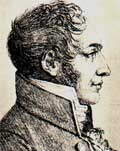Jacques-Alexis Thuriot de la Rozière
Jacques-Alexis Thuriot de la Rozière (born May 1, 1753 in Sézanne (today's Marne department ), † June 29, 1829 in Liège ) was a politician during the French Revolution .
Life
Jacques-Alexis Thuriot de la Rozière worked as a lawyer in Reims and Paris before the revolution . On July 14, 1789, a few hours before the storming of the Bastille , he negotiated on behalf of the Paris district of Saint-Louis-la-Culture with the governor of the Bastille, de Launay , about a non-fighting surrender of the fortress to the rebellious Parisian population.
In August 1791, Thuriot was elected to the legislature by the Marne department. At the end of May 1792 he suggested the deportation of priests who refused to take their oath on the civil constitution of the clergy, and in July 1792 called for the fatherland to be declared in danger. In September 1792, Thuriot was elected to the National Convention by his home department . He stopped at the Montagne , was a member of the Jacobins and the Cordeliers , which was possible at the time. He voted in January 1793 for the death of Louis XVI. and participated in the fall of the Girondins from May 31 to June 2, 1793 . Thuriot served as President of the National Convention from June 27 to July 11, 1793 and was accepted into the Welfare Committee on July 10, 1793 , from which he resigned on September 20, 1793 due to his conflicts with Robespierre .
On September 25, 1793, Thuriot de la Rozière condemned the military measures as well as the economic and social policy of the Welfare Committee in his speech at the National Convention. He took an active part in the de-Christianization campaign from the beginning of November 1793 , but from the end of November 1793 he was one of the “ indulgent ” around Danton , with whom he was privately friends. Thuriot joined Robespierre's opponents after the execution of Danton, Desmoulins and other " indulgent " on April 5, 1794 and supported his overthrow on Thermidor II (July 27, 1794). After that, he stayed with the Jacobins, who were slipping into insignificance, and often represented the only representative of the political left in the later welfare committee, for whom the term the mountain ridge ( La Crete ) came up at that time .
After the Prairial Uprising (May 20 to 23, 1795) Thuriot escaped arrest by fleeing. He was pardoned by the general amnesty of October 26, 1795 and at the end of 1795 appointed commissioner of the board of directors at the Court of Reims. Since April 1803 he worked as a judge at the criminal court of the Seine department and in February 1805 he was appointed deputy general procurator and public prosecutor at the court of cassation.
After the return of the Bourbons , Thuriot de la Rozière had to leave France as a "regicide" . He went into exile in Liège in 1816 and died there on June 29, 1829. His son Alexis Eugène Thuriot de La Rosière was also a member of the National Assembly.
Quote
“ You have to stop this great storm that is leading us into barbarism. "
literature
- Bernd Jeschonnek: Revolution in France 1789–1799. A lexicon. Akademie-Verlag, Berlin 1989, ISBN 3-05-000801-6 .
- Walter Markov , Albert Soboul : 1789. The great French revolution. Urania-Verlag, Leipzig / Jena / Berlin 1989, ISBN 3-332-00261-9 .
Individual proof
- ↑ Quotation from: Markov / Soboul, page 211
| predecessor | Office | successor |
|---|---|---|
|
Jean-Marie Collot d'Herbois |
President of the French National Convention June 27, 1793 - July 11, 1793 |
André Jeanbon |
| personal data | |
|---|---|
| SURNAME | Thuriot de la Rozière, Jacques-Alexis |
| ALTERNATIVE NAMES | Thuriot, Jacques-Alexis |
| BRIEF DESCRIPTION | Politician during the French Revolution |
| DATE OF BIRTH | May 1, 1753 |
| PLACE OF BIRTH | Sézanne (Marne Department) |
| DATE OF DEATH | June 29, 1829 |
| Place of death | Liege |
